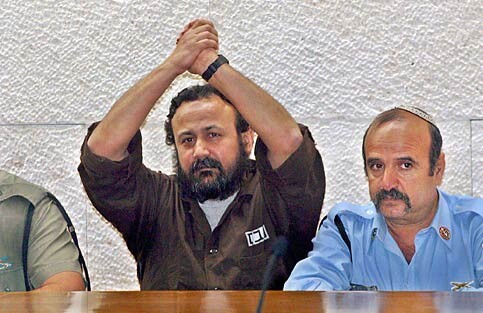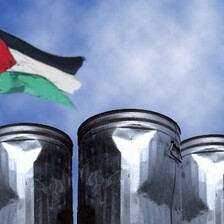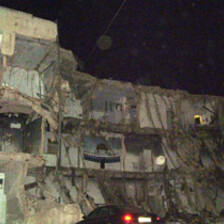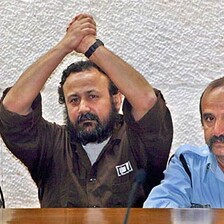Palestine Report 8 December 2004

Marwan Barghouti in an Israeli court, 3 April 2003. (Photo: BAUBAU/SIPA)
When 19-year-old Faeda Ratrout cast her vote for Fateh’s Shabibeh student bloc during student council elections at Nablus’ Al Najah University on November 29, she said she had voted for Fateh “in honor of late President Arafat.” She then added, “I only wish that Marwan Barghouti had nominated himself for the presidential elections because I think he is like Abu Ammar and he represents the younger generation.”
Later that day thousands of students celebrated the Shabibeh’s victory. Al Najah University is the largest university in the Palestinian territories, and it was the first time in nine years that Fateh had won a majority on the student council, a period during which the Palestine Bloc, affiliated with Hamas, had dominated. The victory seemed a good omen for the Fateh leadership overall, as preparations for presidential elections on January 9 got underway.
Two days later, Faeda’s wish also came through. Imprisoned Fateh West Bank Secretary and Legislative Council member Marwan Barghouti announced his candidacy in the elections. The declaration came like a bombshell and resonated throughout Fateh’s various political circles and beyond.
Between wishes and reality
Faeda’s first reaction was one of joy. She said she had even started thinking about volunteering for Barghouti’s campaign.
But three days later this first year student of children’s education had heard enough viewpoints less than encouraging about Barghouti’s candidacy to temper her expectations with doubts.
“I am afraid that Marwan will burn all his bridges,” she said as she digested the angry reactions to Barghouti’s candidacy from many of his own senior colleagues in Fateh.
Faeda’s doubts reflect those of many, especially among the younger generations, as well as in Fateh’s military wing, the Aqsa Martyrs Brigades. Barghouti had earlier seemed to accept Fatah’s nomination of Mahmoud Abbas (Abu Mazen) as its sole candidate, so when his wife Fadwa on December 1, the last day of registration, announced he had officially been registered as a candidate, fears immediately surfaced that his change of heart could split the movement.
“It pained me, as it pained all of our people to see the celebrations of some in the world after the death of our leader and symbol Abu Ammar,” Fadwa quoted her husband as saying when announcing his candidacy. “The implication was that the prospects for peace had opened up now that he was gone, as if he were the obstacle to peace. This criminal insinuation seeks to exonerate [Israeli Prime Minister Ariel] Sharon, his government and the occupation from the responsibility of their terrorism against the Palestinian people. Therefore, I have decided to take part in this democratic battle in honor of the Intifada and the resistance and in defense of them from all those who brand them as terrorism. I am running out of loyalty to President Abu Ammar and in honor of the martyrs, the wounded and the prisoners and out of loyalty to our national constants, in honor of the refugees and the right of return. This stance is a national stance and has nothing to do with posts or seats because there is no seat of power in an occupied homeland.”
Following Barghouti’s announcement, the Fateh Central Committee convened an emergency session that went into the late hours of December 1. Former presidential advisor and Central Committee member Tayeb Abdel Rahim at a subsequent press conference described Barghouti’s decision as, “surprising,” “inexplicable” and “not in line with the Fateh tradition.”
“The movement does not know the reasons that led Barghouti to nominate himself after he had announced earlier in the week that he supported the nomination of Mahmoud Abbas,” Abdel Rahim said. Fateh had made its choice and was not going to relent. “Brother Marwan Barghouti abandoned his bond to Fateh so he can run as an independent candidate. Fateh people would never accept to abandon their ‘Fateh-ness.’”
More than one scenario
No one knows why Barghouti decided to nominate himself, but speculation is rife. One suggested scenario is that Fadwa, a lawyer by profession, persuaded her husband that if he were elected president, it would force the Israeli government to release him given the tremendous pressure it would find itself under both from public opinion and some western governments. Fadwa has denied any truth to this theory.
A second scenario was mooted by Hani Al Hasan, a veteran member of the Central Committee, during an interview with the satellite channel Al Hurra on December 3. Barghouti, according to this theory, has been hoodwinked by Israel into believing that if elected he would be released, a possibility Al Hasan rubbished. “If the Israelis were sincere, they would have already released him so he could nominate himself and run outside of his cell not from inside it.” As for the prospect of a Barghouti presidency, Al Hasan said, “It is unreasonable for the Palestinian cause to be led from inside a prison cell.”
A third scenario is suggested by Barghouti’s own comrades and friends, and lays the responsibility at the door of the Fateh leadership. According to Nasser Juma’, one of the most prominent leaders of the Aqsa Martyrs Brigades in Nablus, the leadership did not show enough appreciation for Barghouti’s initial decision not to contest Fateh’s decision to nominate Abbas, nor did they focus enough on the issue of Palestinian prisoners and democracy and reform. Barghouti has consistently polled as by far the second most popular political Palestinian figure after Arafat, and not running was a “sacrifice.”
“The Fateh leadership welcomed his decision, but Abu Mazen did not hold a press conference saying, ‘Thank you, we will put your demands regarding the prisoners and democracy inside the movement on the top of our priority list.’ Nor did they send a delegation to him in prison to show their appreciation to shed more light on the prisoner file. They said ‘thank you’ and that was it. This made Marwan feel marginalized; he sensed indifference, it provoked him and increased his suspicions,” Juma’ told the Palestine Report.
The Aqsa Brigades originally encouraged Barghouti to nominate himself, and a number of its members and local leaders early declared they would support a Barghouti candidacy. But once Fateh had designated Abu Mazen, as its sole candidate and Barghouti himself declared his backing, the picture changed.
When Barghouti then decided to run after all, some groups within the Aqsa Brigades in Jenin and Nablus’ Balata Refugee Camp declared their support for Mahmoud Abbas and called on Barghouti to reconsider for the sake of the movement’s unity.
Juma’ says discussions are ongoing between Bargouti’s supporters, especially among the resistance groups, where opinions vary between those who applaud the decision and those who believe the candidacy is heading in the wrong direction and does not serve the cause of the people. “We do not want him to be hurt or for this to hurt the unity of Fateh. And of course we don’t want to harm the higher interests of our people.”
According to official Aqsa Brigades sources to the Palestine Report, there are “bumps in the road in regards to the discussions among us.” The source attributed this to their being targeted by the Israeli army. “However, we are confident that we will reach a unified position in regards to our brother Marwan’s candidacy.”
Ways out
Certain circles within the Aqsa Brigades are trying to lessen the impact of the shock created by the “bombshell” to prevent an escalation of the split that occurred between Barghouti and the members of the Central Committee and Fateh’s other institutions.
According to official sources in the Brigades, there are two opposing efforts being exerted to avoid a split in Fateh. The first is to convince Barghouti to rescind his candidacy to preserve his own popularity and status on the one hand and also to spare the street from the ramifications of any split.
The second is directed at the Central Committee to prevent it from putting forth a recommendation to dismiss Barghouti from Fateh or to freeze his membership.
The Central Committee cannot dismiss Marwan outright, but it can put forth a recommendation to that effect in accordance with the movement’s bylaws. Dismissals can only be effected by Fateh’s General Conference, which elected Barghouti as member of the Revolutionary Council in Tunisia on August 4, 1989. This is the conference the Fateh leadership recently agreed to reconvene on August 4, 2005, what would have been Arafat’s birthday, for comprehensive elections to be held to all the movement’s institutions. Indeed, that decision, long a demand from the younger generation of Fateh members was announced immediately after Barghouti declared his support for Abbas and was widely seen as part of a trade off between him and the leadership.
“The leadership’s response was not appropriate,” Fateh Revolutionary Council member Amin Maqboul told PR. However, he does not see this as an acceptable justification for taking a stance that could harm the movement and weaken the democratic and regenerative approach in it. “[Marwan’s] decision greatly harmed all that the younger generation in Fateh is striving for.”
Given there is already a Fateh candidate, Barghouti’s decision was “unjustifiable,” Maqboul said and “harmful to the Fateh approach, which calls for reform, regeneration and democracy in the rank and file of the movement.”
Not everyone sees it this way. Member of the Fateh Higher Committee, Ziad Abu Ein, in an interview with Al Ayyam newspaper on December 1 said Barghouti’s decision to run came after “tremendous pressures from the wide popular base that demanded he nominate himself from inside his prison cell, as a symbol of the resistance, which the people remain faithful to.”
Abu Ein was not concerned that Fateh might face division, “because it cannot be divided. Barghouti was one of the first people who demanded that elections be held in Fateh’s base and called for the expansion of the electoral base of the movement. He is not running as an ordinary candidate. He has a different political program. Within Fateh there are a number of meaningful political trends that have a popular basis. Barghouti represents a wide sector of the movement.”
Wasting votes
One thing all agree on is that Barghouti’s decision to run has blown the presidential race wide open. Opinion polls have him and Abbas more or less neck and neck, and among the other eight candidates at least two, acting speaker of the Legislative Council Hasan Khreisheh and Mustapha Barghouti both have relatively high public profiles, making the field very competitive.
However, some observers fear that the competition and the electoral system will simply lead to the loss of thousands of votes, and weaken the mandate of any elected PA president in the international arena.
Nasif Muallim, secretary general of the NGO committee for observing elections, which includes 108 NGOs in the West Bank and Gaza, explains. “We have 10 candidates. The elections are being carried out according to the Palestinian [electoral] bylaw, which stipulates that the winner is whoever gets the highest votes, that is a simple majority. The law does not stipulate an absolute majority, i.e. 50 percent plus one, in the absence of which a second round between the two highest placed candidates would take place. That way, fewer votes would be lost and the democratic process is strengthened. However, according to the current rules of the game, the person who wins may do so with less than half a million votes, which is a small percentage, while the remaining votes - the majority - are lost.”
According to the Central Elections Committee, the number of eligible registered voters has reached 1,250,800 people. In addition, the Legislative Council has added the civil registrar in order to guarantee the participation of anyone over 18.
Muallim, whose committee will place around 5,000 volunteers to observe the elections, says he hopes the experience of the PLC elections in 1996 will not be repeated, when 668 candidates competed for 88 seats. “The winners represented 32 percent, or one-third of the votes. With those who lost, also went two-thirds of the votes. This harms the democratic process, The Palestinian elections law must be amended.”

Related links:





